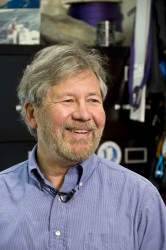UMaine Climate Change Director Receives Highest Honor in His Field
 Contact: Paul Mayewski, (207) 581-3019; Aimee Dolloff, (207) 581-3777
Contact: Paul Mayewski, (207) 581-3019; Aimee Dolloff, (207) 581-3777
ORONO – University of Maine Climate Change Institute Director Paul Mayewski has been lauded worldwide for his work in Antarctica, the Arctic and other remote portions of the planet, and now he has been selected to receive the highest award in his field.
Mayewski will be presented The International Glaciological Society’s Seligman Crystal at a meeting next year.
The award is given from time to time to a person who has made an outstanding scientific contribution to glaciology so that the subject is now enriched.
“It is a great honor for me to be recognized within such a select group of scientists and even more stimulation to continue forward with the research that I have been fortunate enough to share with my colleagues and students,” says Mayewski.
Mayewski has explored more of the Antarctic than anyone else in the world and has led more than 50 research expeditions in the polar and high mountain regions of the world.
Known worldwide for his global scale collection and analysis of ice core samples, he has demonstrated the existence of abrupt changes in climates of the past and the impact of humans on the climate, and has made important predictions about the future.
In addition to the Antarctic, Paul has led scientific expeditions to many remote places including the Arctic and the Himalayas. Through his groundbreaking research, he has observed the historic impact of humans on climate, reconstructed past atmospheric conditions, and demonstrated associations between climate and disruptions to civilization. He has received numerous awards and citations for his seminal contributions to the understanding of climate change.
Author of “The Ice Chronicles,” which was published in 2002 and documents 100,000 years of climate history, Paul speaks to hundreds around the world each year and has appeared on CBS 60 Minutes, Good Morning America, Fox News and NOVA and been interviewed by more than 350 media venues including the Boston Globe, Los Angeles Times, New York Times, and the Christian Science Monitor, as well as by National Public Radio.
As director of UMaine’s Climate Change Institute, he coordinates more than 50 faculty/staff members and researchers plus nearly 30 graduate students who are experts in the fields of climatology, archaeology, glaciology, geochemistry, ecology, history and marine geology.
He founded and currently leads a 21-nation program called the International Trans Antarctic Scientific Expedition (ITASE), whose goal is to understand climate change of the last 200-1000 years in the Antarctic and the Southern Ocean.
